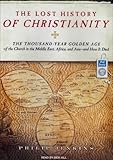A lost history

In his recent Cairo speech President Obama drew attention to the contribution of Islamic culture to civilization. He said,
As a student of history, I also know civilization's debt to Islam. It was Islam — at places like Al-Azhar — that carried the light of learning through so many centuries, paving the way for Europe's Renaissance and Enlightenment. It was innovation in Muslim communities that developed the order of algebra; our magnetic compass and tools of navigation; our mastery of pens and printing; our understanding of how disease spreads and how it can be healed.
What is not as well-known is the contribution to the legacy above, of Christians who had been conquered by Islam. Historian Phillip Jenkins writes,
It was Christians—Nestorians, Jacobite, Orthodox, and others—who preserved and translated the cultural inheritance of the ancient world—the science, philosophy, and medicine—and who transmitted it to centers like Baghdad and Damascus. Much of what we call Arab scholarship was in reality Syriac, Persian, and Coptic, and it was not necessarily Muslim. Syriac-speaking Christian scholars brought the works of Aristotle to the Muslim world: Timothy himself translated Aristotle’s Topics from Syriac into Arabic, at the behest of the caliph. Syriac Christians even make the first reference to the efficient Indian numbering system that we know today as “Arabic,” and long before this technique gained currency among Muslim thinkers…Such were the Christian roots of the Arabic golden age.
The "Timothy" referred to was Timothy I (727-823) patriarch of the Church of the East. He was based in Seleucia, twenty miles southeast of modern Bagdad. In terms of his prestige, and the geographical extent of his authority, Timothy was arguably the most significant Christian spiritual leader of his day.
Peter Pham has written an excellent review of Jenkin's work.

